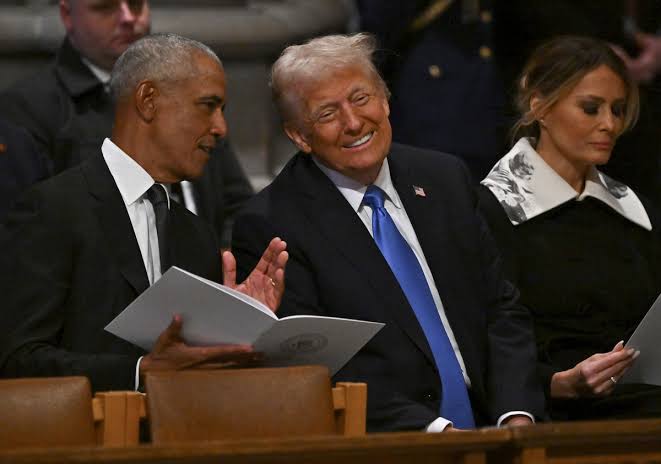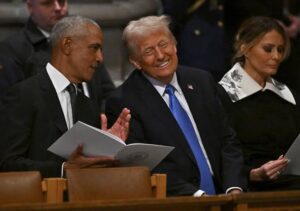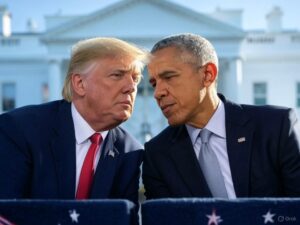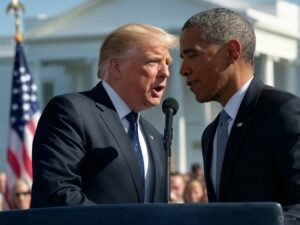NEWS
Breaking News: In a moment that lit up political chatter, President Donald Trump didn’t hesitate when asked about a fantasy face-off against Barack Obama in the 2028 presidential election. Speaking to Fox News’ Peter Doocy on April 1, 2025, Trump grinned and said, “I’d love that. Oh, I’d love that. That’d be a great one. I’d be all in for it…..See More

Donald Trump Reacts To Hypothetical Matchup Against Barack Obama In 2028
On April 1, 2025, President Donald Trump sparked widespread discussion when he enthusiastically responded to a hypothetical question about facing former President Barack Obama in the 2028 presidential election.
Speaking to Fox News reporter Peter Doocy at the White House, Trump said, “I’d love that. Boy, I’d love that. That would be a good one. I’d like that.”
The exchange, while rooted in a scenario barred by the U.S. Constitution, reignited debates about presidential term limits, Trump’s political ambitions, and the enduring rivalry between the two leaders.

This article explores the context of Trump’s remarks, the constitutional barriers to such a matchup, the public and political reactions, and the broader implications for American politics.
The Context of Trump’s Remarks
Trump’s comments came during a period of heightened political activity following his inauguration for a second, non-consecutive term in January 2025.
The question posed by Doocy—“If you were allowed for some reason to run for a third term, is there a thought that the Democrats could try to run Barack Obama against you?”—was framed as a hypothetical, given that the 22nd Amendment to the U.S.
Constitution, ratified in 1951, explicitly limits presidents to two terms, whether consecutive or non-consecutive.
Both Trump, who served from 2017 to 2021 and began his second term in 2025, and Obama, who served from 2009 to 2017, are constitutionally ineligible to run again.
Despite this legal reality, Trump’s response was characteristically bold and unreserved. His enthusiasm for a potential rematch with Obama reflects a long-standing dynamic between the two figures, marked by public sparring and contrasting political legacies.
Trump has often criticized Obama’s policies, while Obama has occasionally taken veiled swipes at Trump’s leadership style.
The idea of a 2028 showdown, though impossible under current law, tapped into this rivalry and captured the imagination of supporters and detractors alike.
The remarks were not an isolated incident. Just days earlier, on March 31, 2025, Trump told NBC News that he was “not joking” about exploring ways to extend his presidency beyond 2028, claiming “there are methods” to circumvent the 22nd Amendment.

While he offered no specifics, his statements fueled speculation about his intentions and prompted a flurry of reactions across media and political circles.
Constitutional Barriers and Political Speculation
The 22nd Amendment states: “No person shall be elected to the office of the President more than twice, and no person who has held the office of President, or acted as President, for more than two years of a term to which some other person was elected President shall be elected to the office of the President more than once.”
This provision was enacted in response to Franklin D. Roosevelt’s unprecedented four-term presidency, ensuring no future president could serve beyond two elected terms.
For Trump or Obama to run in 2028, the 22nd Amendment would need to be repealed or amended—a process requiring a two-thirds vote in both the House and Senate, followed by ratification by 38 state legislatures.
Such a change is widely regarded as a political and logistical long shot, given the amendment’s entrenched status and the polarized state of American politics.
Nevertheless, Trump’s comments align with a pattern of flirtation with the idea of extending his tenure.
In January 2025, Representative Andy Ogles (R-Tenn.) introduced a resolution to amend the 22nd Amendment, proposing that presidents who have served two non-consecutive terms—like Trump—could seek a third term.
The proposal explicitly excluded presidents who served consecutive terms, such as Obama, Bill Clinton, and George W. Bush, from eligibility.
While the resolution has little chance of advancing, it underscores a faction of Trump’s base that supports his continued leadership beyond constitutional limits.
Trump’s allies, including former adviser Steve Bannon, have also hinted at efforts to challenge term limits.
In March 2025, Bannon cryptically remarked, “We’re working on it,” suggesting alternative interpretations of “term limits.” These statements have led some to speculate about legal loopholes, though constitutional scholars dismiss such ideas as unfounded.
For his part, Obama has shown no indication of seeking a return to elected office, having maintained a relatively low political profile since leaving the White House in 2017.
Public and Political Reactions
Trump’s remarks quickly reverberated across social media and news outlets.
On X, the hashtag #Obama2028 began trending on April 1, 2025, as users reacted with a mix of humor, satire, and earnest debate.
Some speculated playfully about an Obama comeback, with one user writing, “Trump wants to ignore the 22nd Amendment? Okay, Barack Obama in 2028. Let’s go.”
Others expressed skepticism or fatigue, with posts like, “Is #Obama2028 seriously trending? Have you fools not learned anything?”
Political figures weighed in as well.
Democrats seized on the opportunity to highlight Obama’s enduring popularity, with some suggesting that if term limits were ever lifted, Obama would be a formidable contender.
One X user quipped, “Trump should really stop talking about running for a third term unless he wants to get absolutely humiliated by President Obama in a presidential race.” Republicans, meanwhile, largely dismissed the exchange as hypothetical banter, though a few Trump loyalists embraced the idea of a third term.
The media response was equally varied. Outlets like HuffPost and POLITICO covered the story extensively, framing it as part of Trump’s broader narrative of testing constitutional boundaries.

Newsweek noted that Trump’s comments sparked a “social media frenzy,” while The Times of India reported on Democratic counterproposals that “if Trump can, then Obama too” should be allowed a third term.
The hypothetical matchup even reached betting markets, with oddsmakers at BetOnline listing Obama as a -200 favorite over Trump (+160) in a speculative 2028 contest, despite its impossibility.
Broader Implications
While Trump’s remarks were delivered with his signature bravado, they raise questions about the stability of democratic norms in the United States.
His repeated references to a third term—whether serious or performative—test the public’s perception of constitutional limits at a time when trust in institutions remains fragile.
Political analysts suggest that Trump’s rhetoric could energize his base while alienating moderates who view such ideas as a threat to democratic principles.
For Obama, the discussion serves as a reminder of his lasting influence. At 63 in 2025, he remains a towering figure in the Democratic Party, and polls have occasionally shown nostalgia for his presidency.












